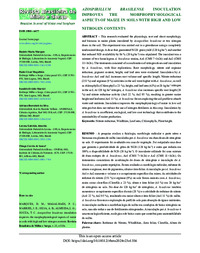Azospirillum brasilense inoculation improves the morphophysiological aspects of maize in soils with high and low nitrogen contents.
Azospirillum brasilense inoculation improves the morphophysiological aspects of maize in soils with high and low nitrogen contents.
Author(s): MARQUES, D. M.; MAGALHAES, P. C.; MARRIEL, I. E.; SILVA, A. B. da; ALMEIDA, L. G.; SOUZA, T. C. de
Summary: ABSTRACT: This research evaluated the physiology, root and shoot morphology, and biomass in maize plants inoculated by Azospirillum brasilense at two nitrogen doses in the soil. The experiment was carried out in a greenhouse using a completely randomized design. A dose that guaranteed N120 grain yield (120 kg ha-1) and another that reduced N20 availability by 86 % (20 kg ha-1) was stipulated. The inoculant was a mixture of two homologous A. brasilense strains, Az1 (CMS 7+1626) and Az2 (CMS 11+1626). The treatments consisted of a combination of nitrogen doses and inoculation by A. brasilense, with four replications. Root morphology, nitrate and arginase reductase, pigment content, height, and leaf area were evaluated. Inoculation by A. brasilense Az1 and Az2 increases root volume and specific length. Nitrate reductase (251 %) and arginase (9 %) activities in the soil were higher with A. brasilense, as well as chlorophylls (Chlorophyll a 23 %), height, and leaf area (63%) at 20 kg ha-1 nitrogen in the soil. At 120 kg ha-1 nitrogen, A. brasilense also increases specific root length (28 %) and nitrate reductase activity (Az1 22 %; Az2 95 %), resulting in greater maize height and leaf area (Az1 11 %). A. brasilense favors exploring the soil profile to absorb water and nutrients. Inoculation improves the morphophysiology of maize in low soil nitrogen but does not reduce the use of nitrogen fertilizers in this crop. Inoculation by A. brasilense is an efficient, ecological, and low-cost technology that contributes to the sustainability of maize production. RESUMO: A pesquisa avaliou a fisiologia, morfologia radicular e parte aérea e biomassa em plantas de milho inoculadas por A.brasilense em duas doses de nitrogênio no solo. O experimento foi conduzido em casa de vegetação. Foi estipulada uma dose que garantiu a produtividade de grãos de N120 (120 kg ha-1) e outra que reduziu em 100% a disponibilidade de N20 (20 kg ha-1). O inoculante utilizado foi uma mistura de duas estirpes de A.brasilense, Az1 (CMS 7+1626) e Az2 (CMS 11+1626). Os tratamentos consistiram de combinação de doses de nitrogênio e inoculação de A.brasilense, com quatro repetições. Foram avaliados a morfologia radicular, redutase do nitrato e arginase, teor de pigmentos, altura e área foliar. A inoculação por A. brasilenseAz1 e Az2 aumenta o volume e o comprimento específico das raízes. As atividades de redutase do nitrato (251 %) e arginase (9%) no solo foram maiores com A.brasilense, assim como clorofilas (Clorofila a 23 %), altura e área foliar (63 %) em 20 kg ha-1de nitrogênio no solo. Na dose de 120 kg ha-1 de nitrogênio, A. brasilense também aumentou o comprimento específico da raiz (28 %) e a atividade da redutase do nitrato (Az1 22 %; Az2 95 %), resultando em maior altura e área foliar (Az1 11 %) do milho. A.brasilense favorece a exploração do perfil do solo para absorção de água e nutrientes. A inoculação melhora a morfofisiologia do milho em condições de baixo nitrogênio no solo, mas não reduz o uso de fertilizantes nitrogenados. A inoculação por A. brasilense é uma tecnologia eficiente, ecológica e de baixo custo que contribui para sustentabilidade do milho.
Publication year: 2024
Types of publication: Journal article
Unit: Embrapa Maize & Sorghum
Observation
Some of Embrapa's publications are published as ePub files. To read them, use or download one of the following free software options to your computer or mobile device. Android: Google Play Books; IOS: iBooks; Windows and Linux: Calibre.
Access other publications
Access the Agricultural Research Database (BDPA) to consult Embrapa's full library collection and records.
Visit Embrapa Bookstore to purchase books and other publications sold by Embrapa.

